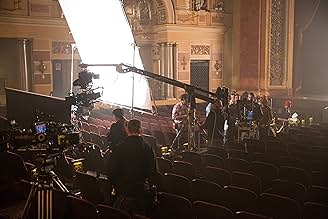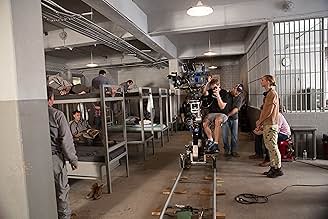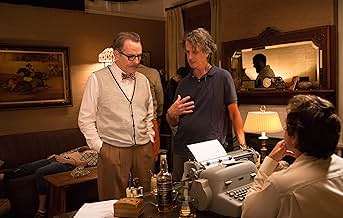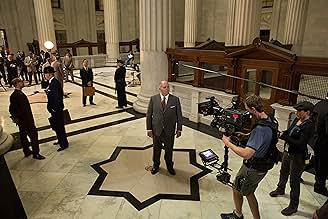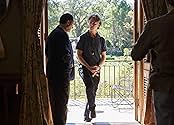CALIFICACIÓN DE IMDb
7.4/10
87 k
TU CALIFICACIÓN
En 1947 Dalton Trumbo era el guionista más codiciado de Hollywood, hasta que él y otros artistas fueron encarcelados y añadidos a una lista negra por sus creencias políticas.En 1947 Dalton Trumbo era el guionista más codiciado de Hollywood, hasta que él y otros artistas fueron encarcelados y añadidos a una lista negra por sus creencias políticas.En 1947 Dalton Trumbo era el guionista más codiciado de Hollywood, hasta que él y otros artistas fueron encarcelados y añadidos a una lista negra por sus creencias políticas.
- Dirección
- Guionistas
- Elenco
- Nominado a 1 premio Óscar
- 8 premios ganados y 45 nominaciones en total
Toby Nichols
- Chris Trumbo (age 6-10)
- (as Tobias McDowell Nichols)
- Dirección
- Guionistas
- Todo el elenco y el equipo
- Producción, taquilla y más en IMDbPro
Opiniones destacadas
9vsks
After practically having the frequently shown previews for Trumbo memorized, I finally saw the film itself. (Though one trailer scene with Helen Mirren didn't actually appear in the movie. Weird.) As you undoubtedly know, Trumbo is the story of the Hollywood 10, writers blacklisted during the communist witch-hunts of the late 1940s and 1950s. Joe McCarthy and all that. When called before the House Un-American Activities Committee, Dalton Trumbo (played beautifully by Bryan Cranston) and the other nine refused to give Congress information about their beliefs or to rat out others in the film industry. As a result, a number of them including Trumbo went to prison for contempt of Congress ("I AM contemptuous of Congress," he said after the HUAC hearing). He was in the slammer for 10 months and once he was out could no longer get work. Meanwhile, some industry personages—in the movie, producer Buddy Ross (Roger Bart) and actor Edward G. Robinson (Michael Stuhlbarg)—saw their careers going up in smoke and did testify (though in real life, Robinson did not name names). The movie effectively skewers that Great American Flag-Waving Hero, John Wayne, who managed to avoid any military service during World War II and Korea. "If you're going to act as if you won the war single-handedly," Trumbo tells him, "it would be more believable if you'd actually served," as he and so many of his black-listed colleagues had. They represent the tip of the iceberg of people harmed by the virulent anti-Communism of the day, and although the movie is about the Hollywood 10, it's really about the Hollywood One, Trumbo, the most accomplished of the lot. The composite character Arlen Hird has the unenviable job of being Trumbo's verbal sparring partner and representing an amalgam of several of the harder-line writers' views. Trumbo is unfailingly supportive of him, even though he inserts his political views into scripts (which Trumbo rewrites) and clearly doesn't trust Trumbo. (This is where the "You talk like a radical, but you live like a rich man" line from the trailer fits in.) While not a lot of acting was required of Diane Lane as Trumbo's wife, she did a fine job, and Helen Mirren is perfect as the odious Hedda Hopper, blackmailer without portfolio. As writer Hird, comedian Louis C.K.'s acting inexperience shows a bit, as he's up against such acting superstars, while John Goodman is all prickly geniality and Alan Tudyk plays a credible Ian McLellan Hunter. Hunter wins the Academy Award for the Roman Holiday script (the Gregory Peck, Audrey Hepburn classic), but Trumbo wrote it. In fact, Trumbo and the others write many screenplays for which they receive credit only belatedly, if at all. The back of the blacklist can't be broken until a few Hollywood luminaries are willing to give appropriate screen credit. Directed by Jay Roach with a solid script from John McNamara. While in their vision, the character of Trumbo doesn't change much over the course of the story—except perhaps to learn not to take what he most cherishes for granted—"he is no more or less principled at the end than he was at the start," said Anthony Lane in The New Yorker. He is forgiving, though, and in the end acknowledges that all humans are a mix of good acts and bad (except perhaps for Hedda Hopper). The real opportunity for learning lies with the audience. While those anti-Communist days may now seem rather quaint—Congress taking on a bunch of two-fingered typists—there always are people who believe they know best what other people should think, who believe others are too dim or inattentive to grasp hidden political messages, who think citizens are like children who have to be protected from difficult ideas. That, the movie Trumbo seems to say, is still the danger. Another film well worth the price of a ticket.
I give this movie an 8 out of 10. I think, technically, it deserves a 6 or 7. It hinges on the modern notion that a biopic isn't complete unless we see all the nuances regarding the protagonist's family life. That is not necessarily the fault of the filmmakers. I don't think a picture can get funded if it doesn't adhere to these modern foibles. I give it an 8, however, and, for its purpose alone, it deserves a 10.
It takes guts to make a movie like this today.
In the United States, we tend to get comfortable and forget that the concept of freedom of speech is the most important idea any human being has ever put forth. We tend to forget that the powers that be don't like that idea.
They really, REALLY don't like that idea.
They want us lowly masses to be good little sheep and do what we're told and think exactly the way they want us to think. We tend to forget that fighting against that tendency of power is a struggle, a painful, sometimes lethal struggle. Folks in other countries know about it. They know all too well. That's why, in spite of all the other problems they may have with the U.S., they still want to live here.
But we've gotten lazy. Not only are there forces on the extreme right that would like to dictate how we live, think, and even breathe--now we have a warring faction from the left, seen most prominently on college campuses, that embraces censorship and the "shutting down" of alternative opinions like little McCarthys on methamphetamine. The concept of a "safe space," where no "offensive" opinions may be heard, is nothing short of censorship. Defenders of this nonsense often make the claim that the government is not getting involved, therefore, it's not a violation of the First Amendment. Here's what's wrong with that argument:
1. Remember our old friend Katherine Hepburn in Adam's Rib? In her closing arguments, she says the law has two parts--the letter and the spirit. It's true, by the letter of the law, students harassing and banning speakers on campus they don't agree with does not equal the federal government censoring those speakers. But it does violate the SPIRIT of the First Amendment. The government, as the film Trumbo clearly shows, cannot always be trusted to safeguard the LETTER of that particular law. It is up to us, We the People, to safeguard the SPIRIT of that law.
2. Trumbo shows us the horrific world where the government trampled on the First Amendment from the top down. What is happening on college campuses today is that violators of what is deemed "politically correct" (a phrase originating from Mao's Cultural Revolution, which should raise several alarms on that basis alone) are subjected to kangaroo courts on the campus, away from legitimate, LEGAL courts of law. They are harassed and humiliated (just as dissenters in the Cultural Revolution were) with no legal recourse. If this practice becomes accepted in normal society, we will have a political environment no different from the times depicted in the film. The only difference--this time, it we have started with the people and spread to a government ready and willing to enact "speech codes" for its own purposes.
By now, those who still, stubbornly, cling to the notion that there is nothing wrong with what is happening on college campuses today will have dismissed this review. They might even leave typical ad hominem attacks on the message boards to make what attempts they can to silence me (to kill the messenger, if you will). This should very well indicate that what I've said is true.
The sane people reading this, no doubt, are asking what the heck this all has to do with Trumbo.
Answer:
Everything.
Having been subjected to a kangaroo court on a college campus where I was called in to the Title IX office for teaching Vonnegut's "Harrison Bergeron," I couldn't help but think, as I watched Trumbo, of the horrific witch hunt I was subjected to. That the film so easily earned my empathy is a testament to how well it's made.
I wish everyone involved a long, healthy career in the movies. We need more stories like this, stories that remind us the struggle to survive as individuals in a world that so stubbornly clings to collectivism is a never-ending battle. It's happened before. It's happening now. If we don't speak up and resist, it will continue happening in the future.
It takes guts to make a movie like this today.
In the United States, we tend to get comfortable and forget that the concept of freedom of speech is the most important idea any human being has ever put forth. We tend to forget that the powers that be don't like that idea.
They really, REALLY don't like that idea.
They want us lowly masses to be good little sheep and do what we're told and think exactly the way they want us to think. We tend to forget that fighting against that tendency of power is a struggle, a painful, sometimes lethal struggle. Folks in other countries know about it. They know all too well. That's why, in spite of all the other problems they may have with the U.S., they still want to live here.
But we've gotten lazy. Not only are there forces on the extreme right that would like to dictate how we live, think, and even breathe--now we have a warring faction from the left, seen most prominently on college campuses, that embraces censorship and the "shutting down" of alternative opinions like little McCarthys on methamphetamine. The concept of a "safe space," where no "offensive" opinions may be heard, is nothing short of censorship. Defenders of this nonsense often make the claim that the government is not getting involved, therefore, it's not a violation of the First Amendment. Here's what's wrong with that argument:
1. Remember our old friend Katherine Hepburn in Adam's Rib? In her closing arguments, she says the law has two parts--the letter and the spirit. It's true, by the letter of the law, students harassing and banning speakers on campus they don't agree with does not equal the federal government censoring those speakers. But it does violate the SPIRIT of the First Amendment. The government, as the film Trumbo clearly shows, cannot always be trusted to safeguard the LETTER of that particular law. It is up to us, We the People, to safeguard the SPIRIT of that law.
2. Trumbo shows us the horrific world where the government trampled on the First Amendment from the top down. What is happening on college campuses today is that violators of what is deemed "politically correct" (a phrase originating from Mao's Cultural Revolution, which should raise several alarms on that basis alone) are subjected to kangaroo courts on the campus, away from legitimate, LEGAL courts of law. They are harassed and humiliated (just as dissenters in the Cultural Revolution were) with no legal recourse. If this practice becomes accepted in normal society, we will have a political environment no different from the times depicted in the film. The only difference--this time, it we have started with the people and spread to a government ready and willing to enact "speech codes" for its own purposes.
By now, those who still, stubbornly, cling to the notion that there is nothing wrong with what is happening on college campuses today will have dismissed this review. They might even leave typical ad hominem attacks on the message boards to make what attempts they can to silence me (to kill the messenger, if you will). This should very well indicate that what I've said is true.
The sane people reading this, no doubt, are asking what the heck this all has to do with Trumbo.
Answer:
Everything.
Having been subjected to a kangaroo court on a college campus where I was called in to the Title IX office for teaching Vonnegut's "Harrison Bergeron," I couldn't help but think, as I watched Trumbo, of the horrific witch hunt I was subjected to. That the film so easily earned my empathy is a testament to how well it's made.
I wish everyone involved a long, healthy career in the movies. We need more stories like this, stories that remind us the struggle to survive as individuals in a world that so stubbornly clings to collectivism is a never-ending battle. It's happened before. It's happening now. If we don't speak up and resist, it will continue happening in the future.
I have seen so many documentaries about this era. The Hollywood blacklist, McCarthyism.
However, this takes a fresh, personal look at what happened. It shows how folks actually handled this, rather than just the circumstances of the time and newsreels of Congress hearings. How did they do it? This shows the how and when, the risks. Of course, Trumbo captures the full story of the persecution.
Stay to the very end of the film, stay for the credits as some of the clips they show are so meaningful.
I don't know if Trumbo was the person shown in the film, but if he was, he was an American hero. I think films like this represent the spirit, the best or worst of the spirit of what happened.
Trumbo wasn't just a hero from the look of it, he was also a survivor who made his way through the worst of it and came out on the other side.
However, this takes a fresh, personal look at what happened. It shows how folks actually handled this, rather than just the circumstances of the time and newsreels of Congress hearings. How did they do it? This shows the how and when, the risks. Of course, Trumbo captures the full story of the persecution.
Stay to the very end of the film, stay for the credits as some of the clips they show are so meaningful.
I don't know if Trumbo was the person shown in the film, but if he was, he was an American hero. I think films like this represent the spirit, the best or worst of the spirit of what happened.
Trumbo wasn't just a hero from the look of it, he was also a survivor who made his way through the worst of it and came out on the other side.
I happened only 70 years ago and so many young people have never even heard about it. How can it be? And, how dangerous. Not to know will always put you at a disadvantage, oh yes, sooner or later. Trumbo feels like a story set in a totalitarian Country and yet...The spread of fear is a powerful weapon used by self-aggrandizing sociopaths. Joe McCarthy's success is still a mystery to me and Trumbo proves, in the most riveting way, how easily we can fall in that trap. Bryan Cranston is simply, sensational portraying a true American in all its contradictions. I never really thought of the actual degradation Trumbo and the other blacklisted writers went through until I saw it in Bryan Cranston's face. David James Elliott portrayal of John Wayne is chilling and disturbing, specially because id true. I've heard from people who knew him, what a nice man Duke was and yet...Helen Mirren as Hedda Hopper was another chilling and unexpected portrait of utter ignorance. I've only recently found out that she was behind the forces that wanted Charles Chaplin out of the Country. Congratulations to director Jay Roach and to a spectacular cast. Let's hope everyone pays attention.
10jmsdxtr
Okay. I'll admit that I gave this film a ten because it should have a higher score altogether than the 7.3 it has, and I wanted to up it. But a solid 8 at least or even a 9, for sure. There are at least two reasons why this fine film is not getting a higher rating, I believe. One is that there are many people (including critics) who look only at it from a political standpoint, both left and right. And those on the right are not going to like it no matter what, fine acting, writing or whatever. The same in the left but conversely (and a smaller number). Secondly, this is a slow and thoughtful film that will not go over with many young viewers who are used to fast paced action and CGI content. they will find neither in Trumbo.
But, for students of history and for people who like a good story, without the fluff, it is all here. Classic good vs evil dynamics coupled with the inherent contradictions. The struggle of lost faith and eventual redemption. And perhaps mostly, excellent social dynamics especially centered around family loyalty and the struggle of holding to ones personal values.
As for the history, there is much here. As stated above more than any film ever having dealt with the subject. Films like "the Front" and "Guilty by Suspicion" are indeed good films that, especially at the time where breaking ground for a more nuanced exploration of the subject. That Trumbo is a biography is advantageous. A real biography, not a overly fictionalized and caricatured profile of the era. This despite that fact that some of the characters are fictionalized, they nonetheless represent the experiences and attitudes of real people. Louis C.K.'s Arlen Hird character being one. Dalton Trumbo may have had a better time of it than most, such as Hird. It is thought by some that the rising star of John Garfield was killed (literally-a heart attack) by the effect of the HUAC on him. This was a time, as the film states when people were fighting for their professional and personal life against what could be called a creeping fascist tendency in the US political environment. The fear and reaction and self promotion of many (ie John Wayne, Hedda Hopper et al.) is evident here.
The writing is excellent. My hat goes off to John McNamara and Bruce Cook for their adherence to historical accuracy and verisimilitude. The dialog is remarkable and keep you involved. It keeps you thinking and hits at an emotional level that few films do at all anymore. But it all comes together with the excellent direction of Jay Roach. To bring together the historical and personal is such a way is no small feat. He deserves an Oscar (as do McNamara and Cook).
I could go on...but just see the movie. You won't regret it. You can still watch Star Wars at Xmas...
But, for students of history and for people who like a good story, without the fluff, it is all here. Classic good vs evil dynamics coupled with the inherent contradictions. The struggle of lost faith and eventual redemption. And perhaps mostly, excellent social dynamics especially centered around family loyalty and the struggle of holding to ones personal values.
As for the history, there is much here. As stated above more than any film ever having dealt with the subject. Films like "the Front" and "Guilty by Suspicion" are indeed good films that, especially at the time where breaking ground for a more nuanced exploration of the subject. That Trumbo is a biography is advantageous. A real biography, not a overly fictionalized and caricatured profile of the era. This despite that fact that some of the characters are fictionalized, they nonetheless represent the experiences and attitudes of real people. Louis C.K.'s Arlen Hird character being one. Dalton Trumbo may have had a better time of it than most, such as Hird. It is thought by some that the rising star of John Garfield was killed (literally-a heart attack) by the effect of the HUAC on him. This was a time, as the film states when people were fighting for their professional and personal life against what could be called a creeping fascist tendency in the US political environment. The fear and reaction and self promotion of many (ie John Wayne, Hedda Hopper et al.) is evident here.
The writing is excellent. My hat goes off to John McNamara and Bruce Cook for their adherence to historical accuracy and verisimilitude. The dialog is remarkable and keep you involved. It keeps you thinking and hits at an emotional level that few films do at all anymore. But it all comes together with the excellent direction of Jay Roach. To bring together the historical and personal is such a way is no small feat. He deserves an Oscar (as do McNamara and Cook).
I could go on...but just see the movie. You won't regret it. You can still watch Star Wars at Xmas...
¿Sabías que…?
- TriviaBryan Cranston revealed in a radio interview that Kirk Douglas approved of this movie, but his major complaint was that he wasn't asked to play himself.
- ErroresWhen the Oscar is presented for Best Screenplay at the 1954 Awards the presenter says, "And the Oscar goes to..." This phrase was not used by presenters until the 61st Academy Awards in 1989. In the 1950s the presenter would have said, "And the winner is..." when presenting an Oscar.
- Citas
Dalton Trumbo: Friends? What friends? Who the hell has the luxury of friends? I've got allies and enemies. There's no room for anything else.
- Créditos curiososAs the credit scroll begins, photos of Dalton Trumbo, his family, and other people portrayed in the film are shown. These are followed by historical footage of Trumbo giving an interview (from the same one where he acknowledges that he is 'Robert Rich').
- Versiones alternativasThe version of the movie that has been screened on Indian theaters and telecast in India is a PG-13 level cut that has been rated UA by the CBFC.
Selecciones populares
Inicia sesión para calificar y agrega a la lista de videos para obtener recomendaciones personalizadas
Detalles
- Fecha de lanzamiento
- País de origen
- Sitios oficiales
- Idioma
- También se conoce como
- Nhà Biên Kịch Trumbo
- Locaciones de filmación
- Productoras
- Ver más créditos de la compañía en IMDbPro
Taquilla
- Presupuesto
- USD 15,000,000 (estimado)
- Total en EE. UU. y Canadá
- USD 7,857,741
- Fin de semana de estreno en EE. UU. y Canadá
- USD 74,177
- 8 nov 2015
- Total a nivel mundial
- USD 11,430,025
- Tiempo de ejecución
- 2h 4min(124 min)
- Color
- Mezcla de sonido
- Relación de aspecto
- 1.85 : 1
Contribuir a esta página
Sugiere una edición o agrega el contenido que falta








